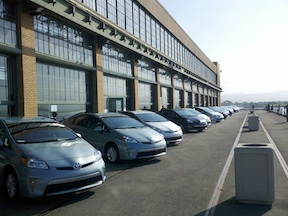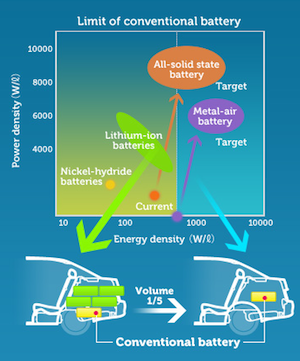 Toyota dominates hybrids with Prius family. This year, Toyota will sell over one million hybrids, more than all other automakers combined.
Toyota dominates hybrids with Prius family. This year, Toyota will sell over one million hybrids, more than all other automakers combined.
By 2015, Toyota Motor Corporation (TMC) will be selling 21 hybrids globally. The Prius family will expand beyond the current four models: Liftback, Compact C, Crossover V, and Plugin. These Prii are popular due to great mileage, resale value after years of reliable service, and the cargo flexibility of these hatchbacks. I’ve found them all fun to drive.
I was once asked, “Why would anyone buy a hybrid when you can’t cost-justify the premium?” I paid about a $4,000 premium to buy my 2002 Prius, and then sold it seven years later for a $3,000 premium. The Prius had saved me over $5,000 in gasoline when gas was cheaper than today. Toyota hybrids have been cost justified for millions of drivers.
Toyota’s success with the Camry Hybrid will lead to other sedans including the new 2013 Avalon Hybrid. In the next three years, look for premium Lexus hybrid sedans. Smaller hybrids are proving a winning combination of sporty driving, great mileage, and fitting the needs of urban driving. Witness the success of the Prius C, the Lexus CT200h, and the Yaris Hybrid in Europe.
 More people seem to be hit with hundred-year storms arriving every year in downpours and blizzards. Toyota will continue improving its all-wheel drive SUVs such as the Highlander Hybrid AWD and Lexus RX 450h AWD. By 2015, Toyota is likely to offer more choices in hybrid SUVs and crossovers with optional AWD.
More people seem to be hit with hundred-year storms arriving every year in downpours and blizzards. Toyota will continue improving its all-wheel drive SUVs such as the Highlander Hybrid AWD and Lexus RX 450h AWD. By 2015, Toyota is likely to offer more choices in hybrid SUVs and crossovers with optional AWD.
All of these hybrids include efficient electric motors and advanced batteries. Toyota’s decade of electric drive experience is leading to more exciting electric cars in addition to the 21 hybrids in all of its brands including Toyota, Prius, Lexus, and Scion.
Toyota is now offering the Prius PHV, a plug-in hybrid. Primarily for fleets, TMC offers the all-electric RAV4 EV and the Scion iQ-EV micro-compact all-electric. For fleets, look for Toyota to commercialize its fuel-cell vehicle, which extends the range of its electric, drive system with a hydrogen fuel cell that generates enough electricity for hundreds of miles of range. All of these new electric offerings use lithium batteries, not the traditional NiMH batteries used in other TMC hybrids. We forecast that by 2015, the smaller, lighter lithium batteries will be used by TMC in all its hybrids.
Like all automakers, TMC is only revealing glimpses of its future plans. Toyota has revealed plans for more plug-in choice and emergency home power backup: “TMC plans to enhance the appeal of the ‘Prius PHV’ plug-in hybrid vehicle by expanding available vehicle grades and by offering an accessory outlet designed to use the hybrid system as a power supply that can also be used in times of emergency.”
Each new model appears incremental. The Prius family includes a plug-in with only 15 miles range. This Prius PHV is the only Prii to use lithium batteries, while Ford, Honda and Hyundai go all-in for newer, smaller, lighter lithium batteries for all their hybrids. But take Toyota’s plans for at least 25 new hybrids and electrics, and you see that they are leading the transition to efficient, solid, fun to drive cars with electric motors, advanced batteries, and sophisticated electronics.
Toyota Responds to Challenges from Honda and Ford
 TMCs customers want more hybrid choices and TMC is delivering. Toyota is also protecting itself against growing competition. Honda continues to improve the electronics, performance, and fuel economy of the Insight, CR-Z, and Civic Hybrid. Hyundai and Kia have attractive hybrids at attractive prices. The new Ford Fusion Hybrid bests the popular Camry Hybrid by offering 47 mpg, better telematics, and more cargo flexibility. The new 47-mpg Ford C-MAX Hybrid has the spacious appeal of the Prius V with fewer trips to the gas station.
TMCs customers want more hybrid choices and TMC is delivering. Toyota is also protecting itself against growing competition. Honda continues to improve the electronics, performance, and fuel economy of the Insight, CR-Z, and Civic Hybrid. Hyundai and Kia have attractive hybrids at attractive prices. The new Ford Fusion Hybrid bests the popular Camry Hybrid by offering 47 mpg, better telematics, and more cargo flexibility. The new 47-mpg Ford C-MAX Hybrid has the spacious appeal of the Prius V with fewer trips to the gas station.
Competitors are not only challenging Toyota with advanced electric drive systems, but also with more efficient diesel engines and gasoline engines that use direct injection and turbocharging.
Unlike Toyota, all of these competitors have switched to lithium batteries in their hybrids. Yet, TMC may leapfrog its competition in battery packs. TMC has developed at a special-purpose in-house research division new battery cells that offer improved output density over all-solid-state batteries. TMC is also working on wireless battery charging, which will enhance the charging convenience of plug-in hybrid vehicles (PHVs) and EVs.
New 38.5 % Efficient Gasoline Engines and New Diesel
Some 2013 Toyota hybrids will use an enhanced engine for use in hybrid vehicles, based on the 2.5-liter AR gasoline engine, adopts the Atkinson cycle and D-4S4 system. The enhanced engine achieves the world’s highest maximum thermal efficiency of 38.5 percent, realizing both high fuel efficiency and high output.
Starting 2014, TMC plans to launch a vehicle with a new 2.0-liter, turbo-charged AR engine, also based on the 2.5-liter AR gasoline engine. The new engine’s smaller displacement will provide higher fuel efficiency while the turbocharger will improve output.
In Europe, Toyota is selling millions of the Yaris by giving customers the choice of gasoline, diesel, or hybrid.
TMC diesel improvements for 2015 include an increase in fuel injection system pressure and a compact, high-efficiency turbocharger that enable the 1.4-liter ND diesel engine to achieve fuel efficiency and driving performance. This and exhaust gas cleaning technology enabled the engine to pass the Euro 6, one of the most stringent exhaust emission standards in the world.
The 3.0-liter KD diesel engine for commercial vehicles uses i-ART6, the world’s first injection system to maintain a high level of injection precision at high pressure, achieving high fuel efficiency and low emissions. TMC first installed the engine in the “Hilux” pickup truck for the Brazilian market in April 2012.
New CVT and 8-Speed Transmissions
TMC has improved its continuously variable transmission, Super CVT-i, with superior fuel efficiency, smooth acceleration, improved integrated engine control, and reductions in both size and weight. The transmission, first installed on the Corolla for the Japanese market in June 2012, is planned for use on additional models, particularly in the compact segment
A new front-wheel-drive eight-speed, automatic transmission—as compact and lightweight as a six-speed automatic transmission—provides smooth and highly receptive acceleration with highly responsive gear shifting, as well as superior fuel efficiency. The new transmission was first installed on the Lexus “RX 350 F Sport” SUV for the Northern American market in August 2012.
TMCs latest hydrogen PEM fuel cell stack achieves the world’s highest power output density. TMC plans to launch a new fuel cell bus (FC bus) currently in development with Hino Motors, Ltd. (Hino) and fuel-cell passenger vehicle for fleets.
Toyota’s exciting future plans will help us make fewer trips to the gas station, clear the air, reduce greenhouse gas emissions, and be more energy secure. Fleets will not be dependent on one fuel for all needs as the mix using gasoline, diesel, hydrogen, and electricity. For millions, fueling may never be farther than their garage.

I love that you noted that Toyota has responded to Ford when it comes to Hybrid technology. I think we’re answering the call quite well. We easily have the most successful hybrid technology and I’m glad we’re getting some challengers so that we can be pushed to innovate!
@Fox Toyota,
Actually, I think your comment may have it backwards – or we are just going through a new generation of back-and-forth. Toyota clearly started the hybrid market and Ford has now responded in kind. Now, once again, Toyota needs to pick up its game, as it appears to be doing. ed-Michael Coates